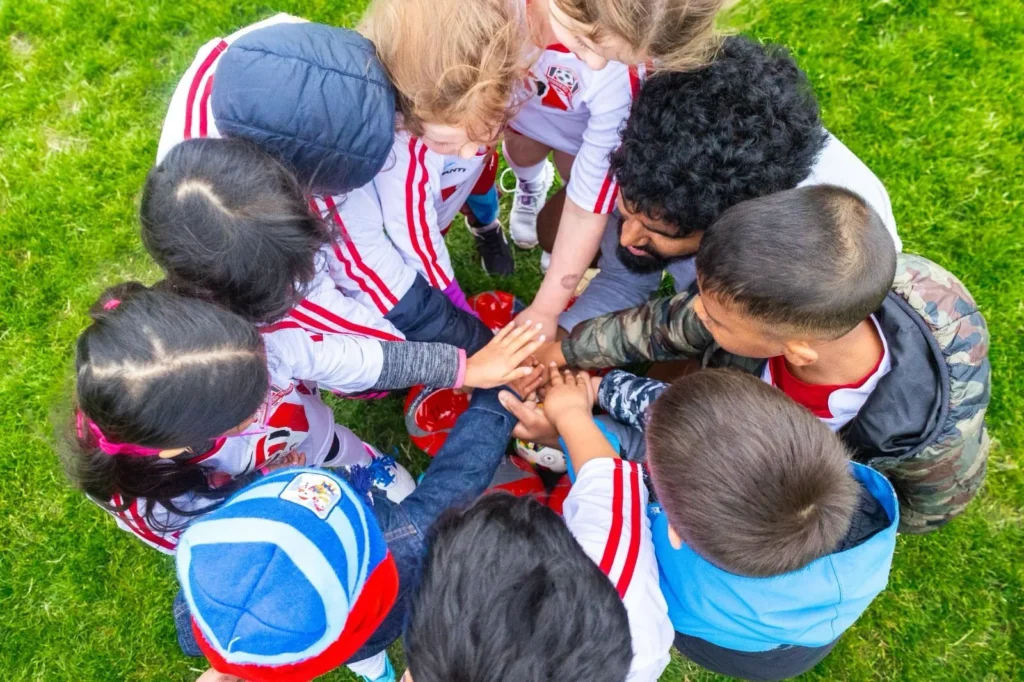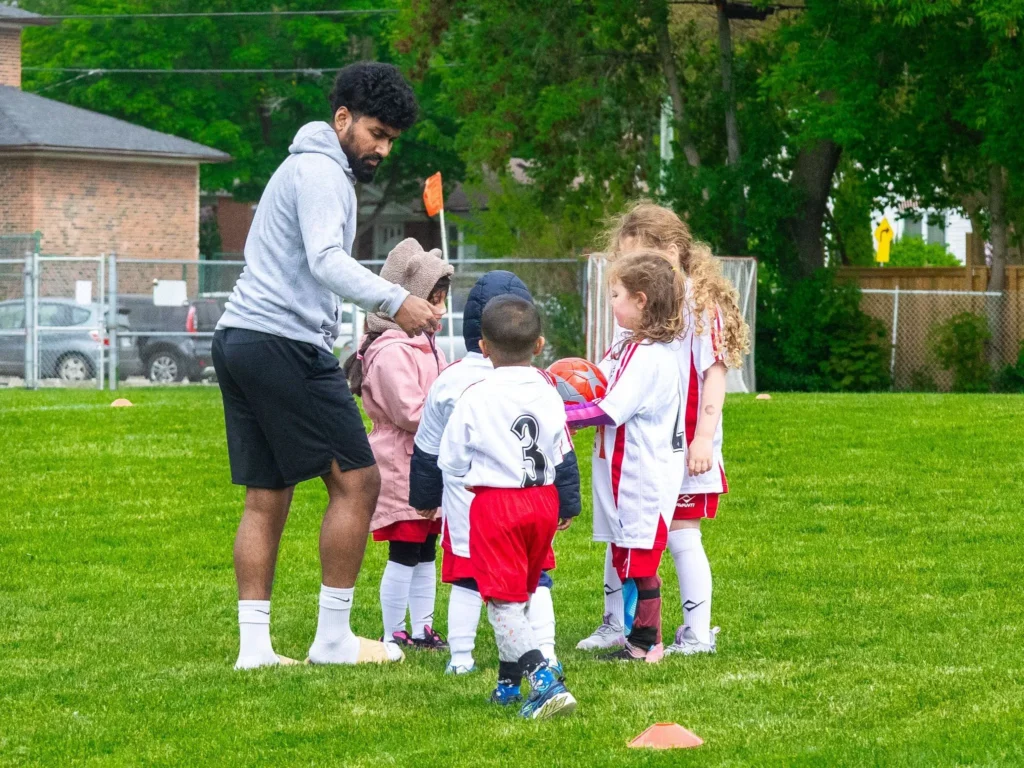As an experienced soccer coach working with young players in Toronto, I often hear parents ask, “What’s the right path for my child?”
The truth is, every player moves through four main phases of youth soccer development: Discovery in the early years, Foundational Skills, Tactical Thinking for competitive play, and finally, Performance and Refinement.
Understanding these phases helps you support your child’s growth, choose the right type of soccer training, and avoid common mistakes that can hold them back. Once you know what to focus on at each stage, your child’s development becomes clearer, more enjoyable, and far more effective.
What We Mean by a “Phase” in Soccer Development

A phase is simply a stage in a young player’s growth. Each one focuses on key skills, habits, and goals. Good coaching meets the player where they are, not where adults expect them to be.
A six-year-old should not train like a fourteen-year-old. Recognizing these phases helps coaches and parents give the right challenges at the right time. That’s how young players build confidence, skill, and a lasting love for the game.
The Four Youth Soccer Development Phases Explained
Different coaches and programs may call them slightly different names (for example, Discovery, Early Years, Learning to Train, Train to Compete, or Performance Stage), but the idea is the same: every player grows step by step.
Phase 1: Discovery and Movement (Ages 4–7)
Also known as: Active Start, Introduction Stage, Early Learning Phase
- Focus: Fun, movement, and comfort with the ball.
- Main Goal: Let kids fall in love with the game.
- What They Learn: Running, balance, coordination, and simple ball control.
- Parent and Coach Role: Make it playful. Celebrate effort. Don’t worry about winning or tactics yet.
At this age, it’s all about joy and curiosity. Play short games, keep sessions under an hour, and let kids soccer explore freely. Every smile matters more than any score.
Phase 2: Learning and Skill Building (Ages 8–10)
Also known as: Fundamental Stage, Learning to Train, Foundation Phase
- Focus: Basic soccer techniques and teamwork.
- Main Goal: Build confidence with the ball.
- What They Learn: Dribbling, passing, first touch, shooting, and small-team play (3v3 or 4v4).
- Parent and Coach Role: Encourage trying new things. Praise creativity. Don’t specialize them into one position too early.
This stage is about learning the “language” of soccer, how to move, pass, and play together. Mistakes are normal and healthy here. The more touches, the better the learning.
Phase 3: Game Understanding and Smart Decisions (Ages 11–13)
Also known as: Soccer Awareness, Train to Train, Formal, Tactical Development Phase
- Focus: Thinking during play, learning how to use space, timing, and teamwork.
- Main Goal: Build game sense.
- What They Learn: Reading plays, teamwork, communication, and basic strategy (when to pass, shoot, or move).
- Parent and Coach Role: Ask guiding questions like, “What could you do differently next time?” Help them think, not just react.
At this age, kids begin to see soccer as a team game, not just individual effort. They start noticing positioning, passing lanes, and team movement. Encourage smart play instead of fancy tricks.
Phase 4: Performance and Confidence (Ages 14+)
Also known as: Train to Compete, Competitive Stage/Excel, Performance and Refinement
- Focus: Playing with purpose and discipline.
- Main Goal: Develop consistency, strength, and focus.
- What They Learn: Position-specific skills, fitness, leadership, and emotional control.
- Parent and Coach Role: Support balance, school, rest, and health matter as much as practice. Keep motivation strong, not stressful.
At this level, players begin shaping who they’ll become. Whether that’s a competitive athlete, a school leader, or a lifelong player. Encourage good habits and goal setting. Progress comes from patience and hard work, not shortcuts.
How to Know Which Phase Your Child Is In

Use these quick signs:
- Phase 1 (Discovery): Loves to run and play, short attention span, enjoys fun games more than drills.
- Phase 2 (Learning): Starting to control the ball, eager to learn, loves short matches.
- Phase 3 (Understanding): Talks about positions, passes more, learns from mistakes.
- Phase 4 (Performance): Thinks about improvement, enjoys competition, shows focus and discipline.
Remember: kids develop at different speeds. It’s okay if your child’s progress doesn’t match someone else’s. Growth in soccer, like in life, isn’t a race. Learn more about the best age to start soccer and how to match your child’s training with their phase.
Training Tips for Each Phase
Here’s a quick “dos & don’ts” for each phase:
| Stage | What to Focus On | Avoid Doing |
| Discovery & Play | Keep it fun, short sessions, movement games | Don’t over-coach or correct too much |
| Learning & Skill | Practice simple drills, encourage touches | Don’t focus on winning or strict positions |
| Game Understanding | Use small games with roles, build awareness | Don’t overload with advanced tactics |
| Performance & Confidence | Build routine, leadership, and fitness balance | Don’t push nonstop competition or overtraining |
Balance is key. Two to three sessions per week is plenty. Rest and play outside of soccer are just as important as training.
The Role of Parents & Coaches Through the Phases
- Parents: Be the encourager. Cheer effort, not just goals. Ask what they enjoyed, not how many they scored.
- Coaches: Give short, clear feedback. Celebrate progress. Adapt training to the player’s stage, not the parent’s expectations.
- Together: Create a positive space where kids can grow, fail safely, and keep their love for the game alive.
Soccer development is not about perfection. It’s about steady, happy growth.
Conclusion
Soccer development is not about rushing or comparing. It’s about enjoying every step of the journey. Every child learns, grows, and builds confidence in their own way. As a parent or coach, the best thing you can do is keep the game fun, supportive, and full of small wins that inspire big dreams.
Understanding your child’s development stage is just the first step. At 416 Soccer Club, we design age-appropriate programs that build skills, confidence, and a lifelong love for the game.
